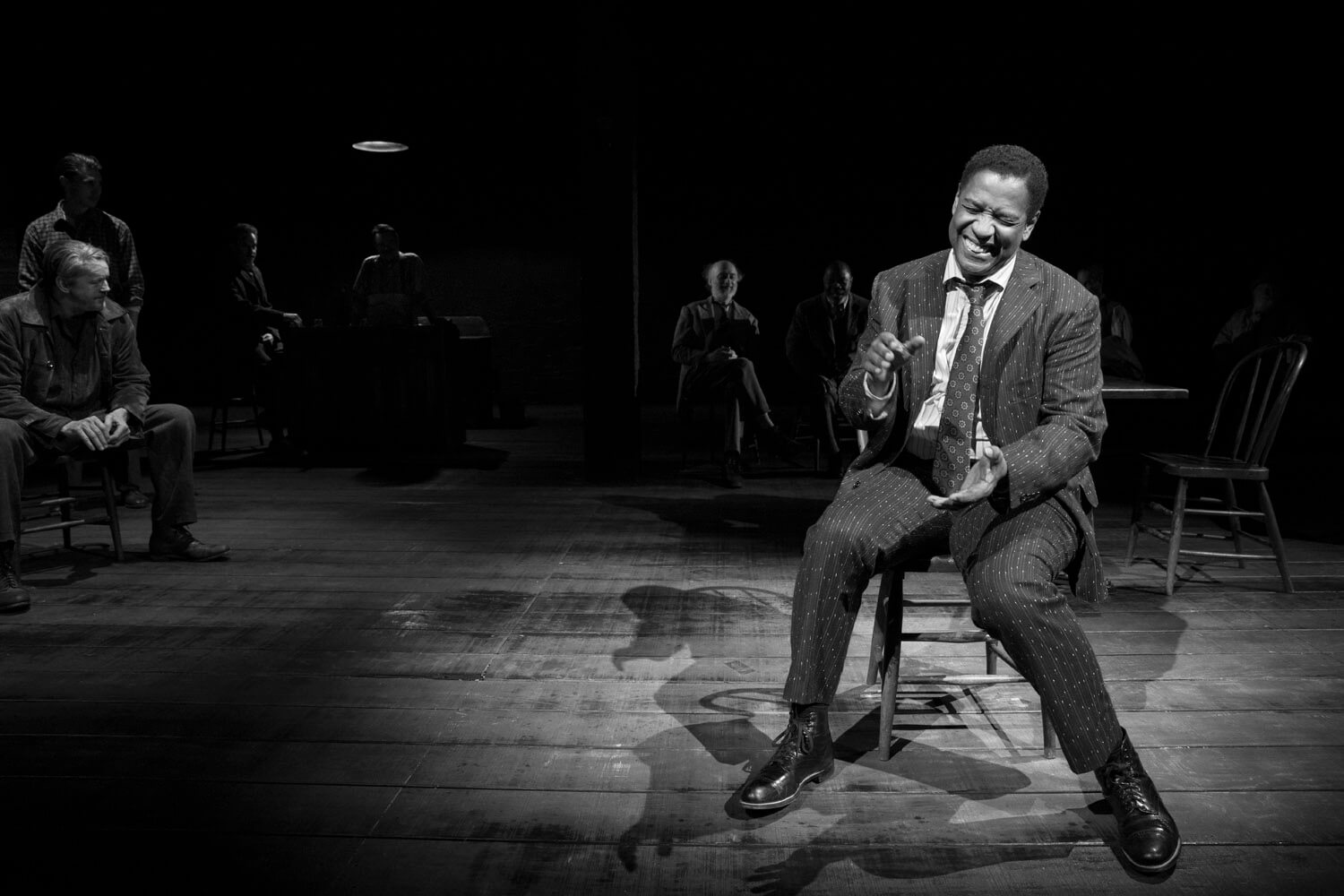The Iceman Cometh

The booze-soaked Eugene O’Neill drama, The Iceman Cometh, with Denzel Washington stoking the madness, is an experience. Running nearly four hours, it takes more than just the gift of gab to hold our attention. And this bar full of weirdos, with all of their crazy delusions, make for a fascinating bunch. Not to mention Washington, who plays a robust energetic Hickey, a salesman, who ultimately trades in disappointment and failure.
A fearless actor, Washington, sitting in a chair at the edge of the stage, delivers his lengthy soliloquy. Portraying Hickey, he is direct, open, and unflinching. As helmed by George C. Wolfe, the revival also boasts an extraordinary ensemble of Broadway veterans, with David Morse, Neal Huff, and Frank Wood among them. Together, they create an intriguing study in character, or its absence.
In keeping with O’Neill’s style, the drama unfolds through a series of confessions which reveal the characters, with all of their shortcomings, and their hollowness. Like Long Day’s Journey into Night, Iceman follows the characters’ descent into drunkenness and mental disintegration, while exposing the lying and self-deceit which lead to their demise.
The inability to face oneself truthfully is a central conflict for many of O’Neill’s characters. Indeed, the drunks sitting around Harry Hope’s bar avoid their inner turmoil. They either lie or attribute their failures to the lies others tell.
That disillusionment is upfront from the get go, when we meet Larry Slade (Morse), an anarchist who betrayed the movement. Having fallen into his own existential hell, he knows no exit. Making a self-assured Broadway debut, Austin Butler plays the son of Larry’s ex, also an anarchist, and now in prison. Looking to Larry to help him find his inner strength, he falls into the void.
The Movement, and the idealism it represents, stands as a kind of manifesto here. Clearly, it’s more of a front than a belief system, a pseudo-philosophy that serves them well in begging a free drink and bullying the system for payoffs.
It’s not politics or the nature of political authority that is examined here, but rather the psychology of human aggressiveness. Indeed, the underlying tension is not about the economics of society, or the poverty these drunkards have fallen into. It is simply and overtly about the conflict between life (Eros) and destruction (Thanatos), with the latter winning.
The women in the cast, Tammy Blanchard and Nina Grollman among them, can find few options in this jaded world. No more hopeful are they than Willie Oban, a role in which Neal Huff mines the pathos of a young man who, geared for success, winds up drunk and powerless. With his wild hair, he flails around, suffering from the DTs. And Bill Irwin (Ed Mosher) sadly descends to playing clownish tricks just to get his hands on the booze. Impressively, Clark Middleton as Hugo Kalmar transforms into a physically deformed, emotionally distorted old man.
Designer Santo Loquasto’s cavernous watering hole looks old and dried up. Darkly lit by Jules Fisher and Peggy Eisenhauer, it feels like we’re watching characters emerge from a cave, only to retreat back to the shadows. Ann Roth has costumed these ageing alcoholics in suits of various vintage, and rags.
In Wolfe’s hands, every performance on the stage of the Bernard B. Jacobs Theatre is a world unto itself — a nihilistic one at that.
Peace for Mary Frances
In the final days of life, Mary Frances (Lois Smith) gets to watch her children vie for her love and the family inheritance. Set in the home where she raised her three children, the staging (scenic design by Dane Laffrey) feels very slice of life, a literal — or as close to literal — reflection of a family home as one could find. Peering through the fourth wall, we observe their behaviors, so dysfunctional that it makes our own look “normal” by comparison.
To everyone’s discomfort, especially her own, Mary Frances takes a long time to die. In the world of modern medicine, such is fate. And Smith, such an endearing presence in films, from East of Eden (1955) to last year’s Ladybird, feels completely natural in her discomfort and her need for finality.
Sadly, the children, for all of their differences, are something of a one-note chorus. They’re out for themselves and the biggest share of mom’s inheritance that they can grab. Consciously or not, mom enables them all by pitting one against the other.
Director Lila Neugebauer mines the emotional depth of these characters and their relationships. Once again, J. Smith-Cameron (Alice) is a force of nature, her mere presence radiating a sense of truth, of being in the present. While Alice is manipulative, she is honest, and she’s a sibling with whom we can easily identify.
As her crazy sister Fanny, Johanna Day plays a recovering addict who is also manipulative, in an unpredictable and unsettling way. It’s the codependency between her mother and she, which fuels the family’s dysfunctionality. In addition, Paul Lazar as Eddie is a queer egg. Geeky looking and self-observed, he’s a typically dissociated brother.
Fortunately, both Heather Burns and Natalie Gold, as Alice’s daughters, bring a bit of vitality to the situation. The hospice workers, played by Mia Katigbak and Brian Miskell, intervene, compassionately at times.
About the end of life, Lily Throne’s play is unsentimental. And death is relief.



